1. The Boers, British and discovery of minerals
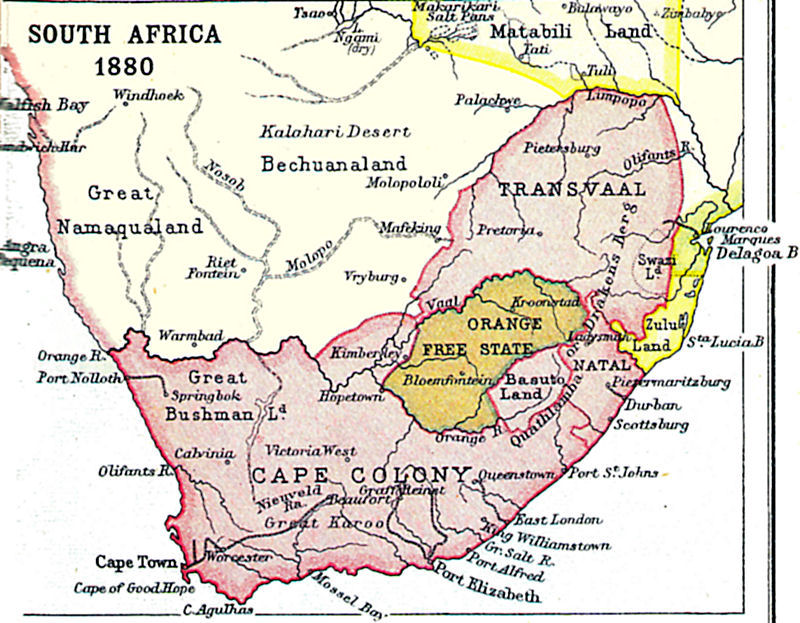
In the second half of the 19th Century, South Africa was occupied by first the Dutch and then the British. The conflict between these two European races to control the land, and the mineral reserves which were discovered from the 1860s, was to lead to two wars. It was also to result in the death and subjugation of the African inhabitants of this area.
South Africa in 1880
What was the situation in South Africa by 1880?
What was the impact of the discovery of gold and diamonds?
Who was Cecil Rhodes?
Who were the Boers?
Before European colonisation, South Africa was home to different African peoples whom the later European settlers were to call Bantus.
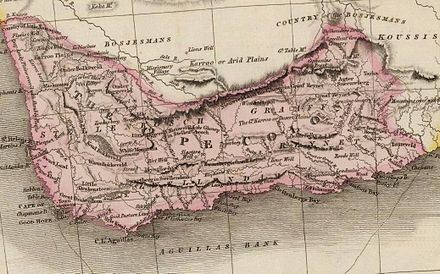 In the late 17th Century the Dutch East India Company set up a small trading station near the Cape of Good Hope on the southern tip of South Africa. The poorest members of this deeply Protestant community set up farms and also used slaves who had been trafficked from elsewhere in Africa. These farmers or Boers, as they became known, came into conflict with the indigenous San and the Khoi, and then as they began spreading out, with the more powerful Xhosa population.
In the late 17th Century the Dutch East India Company set up a small trading station near the Cape of Good Hope on the southern tip of South Africa. The poorest members of this deeply Protestant community set up farms and also used slaves who had been trafficked from elsewhere in Africa. These farmers or Boers, as they became known, came into conflict with the indigenous San and the Khoi, and then as they began spreading out, with the more powerful Xhosa population.
Map of the Cape Colony in 1809
The Boers viewed themselves as a distinct and unique group of colonists. They called themselves 'Afrikanders' (the people of Africa), spoke a variant of Dutch they called Afrikaans, and were hostile to both the indigenous peoples and to other Europeans.
What was their relationship of the Boers with the British?
In 1806, during the Napoleonic Wars, the British captured Cape Colony so that it would not fall into the hands of France.; henceforth the Cape of Good Hope became a crucial naval base for Britain on the trade route to India and the Far East. In 1814 the Dutch government formally ceded sovereignty over the Cape to the British, under the terms of the Convention of London.
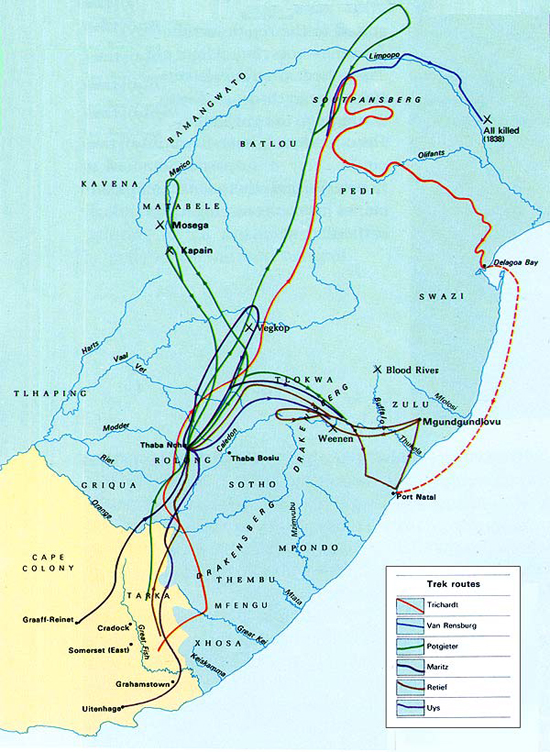
Relations between the British and the Boers was uneasy but tensions came to head in 1834 when the British abolished slavery. Many of the Boers who kept slaves could not accept this decision and so moved away from British rule. They crossed the Orange and Vaal rivers on a 'great trek' and set up two independent states - Transvaal and the Orange Free State.
These areas were largely uninhabited, mainly because of local wars and famine. The myth developed that they had moved into an empty land and Afrikaners subsequently used this to suggest that Africans had no right to the land of South Africa and that South Africans had moved into these areas at roughly the same time as the Boers themselves.
This myth was strengthened by their victory over the Zulus in 1838 at the Battle of Blood River (see map). The Boers were alleged to have made a Covenant with God asking for victory and so it now seemed that God had granted them the land they had inhabited.
Research further the 'empty land' myth. This is important for understanding the attitudes and actions of the Afrikaaners when they set up the apartheid state.
This article from South African History Online is a good starting point.
Although Britain recognised their independence, relations between the two groups remained tense. In 1877 Britain took control of the Transvaal over the Zulu threat when the Boers asked for their help.
In 1881, Paul Kruger - Transvaal President - successfully attacked the British at Majuba Hill in 1881. As a result, the British government decided to restore partial independence. This was done under two agreements signed in 1882 and 1884. However, Britain still supervised foreign policy. This was vital form of control because it placed important constraints on the Transvaal's ability to form links with Britain's European rivals, particularly Germany.
Review the build-up of tension between the Boers and the British, and the events of the First Boer War in this video.
What factors are given for Britain's defeat in this war?
 Diamonds had already been discovered in an area adjoining the confluence of the Vaal and the Orange rivers, just north of the Cape Colony in 1867. The British government, attracted by the prospect of mineral wealth, had quickly annexed the diamond fields, repudiating the claims of the Voortrekker republics to the area.
Diamonds had already been discovered in an area adjoining the confluence of the Vaal and the Orange rivers, just north of the Cape Colony in 1867. The British government, attracted by the prospect of mineral wealth, had quickly annexed the diamond fields, repudiating the claims of the Voortrekker republics to the area.
Four mines were developed, and the town of Kimberley was established. Within two decades of the first diamond find, the industry was essentially controlled by one monopolistic company -Cecil Rhodes's De Beers Consolidated Mines. The diamond industry brought wealth into the Cape and also a substantial growth in population.
However, it was the discovery of gold in the Transvaal that really transformed the situation in South Africa - not only economically, but also politically. Whereas the British had easily got control of the diamond mines, by simply annexing the area to the Cape Colony, the Witwatersrand in Transvaal, where the gold reserves were located, was in the heart of the territory controlled by the Afrikaners. As Piers Brendon writes, 'Suddenly, from being a needy, rustic backwater, Kruger's republic became El Dorado'. (Decline and Fall of the British Empire, pg187)
The 'mineral revolution' transformed the economic balance in the region. The Transvaal suddenly changed from being a backward agricultural economy into a country which was rapidly increasing in prosperity and which threatened to dominate the British colonies in South Africa; by the end of the 19th Century, the Transvaal had become the major supplier of gold, producing over 25 per cent of total output.
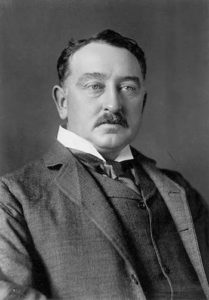 In the hope of encircling the Transvaal and discovering new mineral deposits to the north, the British government gave a royal charter to the south Africa Company of millionaire businessman Cecil Rhodes (see above and also photo to the left).
In the hope of encircling the Transvaal and discovering new mineral deposits to the north, the British government gave a royal charter to the south Africa Company of millionaire businessman Cecil Rhodes (see above and also photo to the left).
By the mid-1890s however, the policy of encirclement lay in ruins; no mineral wealth was found and in addition, the opening in 1894 of the railway linking Delogoa Bay in Portuguese Mozambique to Witwatersrand meant that the Transvaal, for the first time, possessed a route to the sea which avoided British territory.
However, much of the Transvaal's new wealth was in the hands of British and German gold and diamond mine owners - the 'Rand millionaires' who had established mines in the area, having attracted large amounts of British investment.
The discovery of gold had profound social effects on the Transvaal. Male workers known as 'uitlanders', from Britain, continental Europe and further field poured into the Transvaal to dig for gold. There were 44,000 by 1896 - thus outnumbering Boer males in the Transvaal. Johannesburg, the newly established hub of this industry, grew rapidly and had a population of 75,000 Europeans by the end of the century, which made it the largest city in southern Africa.
This population influx was a threat to the Boer character of the state. In order to maintain its control of gold mining, the Transvaal government restricted the voting rights of Uitlanders. Only foreigners who had been in the country for 14 years or more could vote.
The gold mines employed 100,000 African labourers, five times as many as did the diamond mines, and drew these men from throughout southern Africa, although most came from Portuguese-ruled areas of Mozambique. The mines needed vast numbers of cheap labour to be profitable and so the African workers found themselves subjected to an array of discriminatory rules and practices designed to keep workers cheap and pliable. For example, to induce more African men to leave their farms in the countryside and work in the mines, the central government imposed a “poll tax” on every African male and a “hut tax” that black communities had to pay for each hut in their community.
The discriminatory system that established at this point, was to continue in the next century and lay the foundation of the segregation and apartheid laws that you will read about.
The discovery of gold tilted the balance of political as well as economic power across the continent; Kruger used Transvaal's new wealth to challenge British supremacy in the region (e.g. by building the railway mentioned above). He also tried to maintain political control by refusing the uitlanders a vote.
By the mid 1890s, the assumption of the British colonial Office that a 'peaceful commercial annexation of the country [the Transvaal]' would result from the irresistible progress of British enterprise, technology and migration seemed increasingly optimistic. The balance of power in South Africa seemed to be shifting from the Cape to the increasingly prosperous and powerful Transvaal.
This tension between Boers and the British that this situation created, as well as Kruger's attempt to suppress uitlander rights, was to lead to war, as you will read about on the next page.
Read this article on the roots of Apartheid in the mining industry from a Canadian organisation - the CJPME Foundation.
Make notes on the restrictions placed on South African workers, the conditions they faced and the laws passed in the early years of the industry.
I contend that we are the finest race in the world and that the more of the world we inhabit the better it is for the human race...
Cecil Rhodes, 1877
Rhodes was a British imperialist who had very clear views on the role of the British in Africa, and indeed, the world. As you have read above, he played a key role in the development of the diamond industry and also, as you will read on the next page, played a key role in the start of the second Boer War in his quest to get British control of Africa 'from Cape to Cairo'.
1. Read this essay that Cecil Rhodes wrote at the age of 23. It is called Confessions of Faith.
What were Rhodes's key ideas regarding British imperialism?
2. What is the message of this cartoon from the British magazine, Punch. It was entitled, The Rhodes Colossus and published in 1892? (note that Rhodes is holding in his hands a telegraph line)
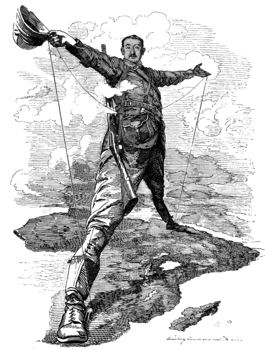
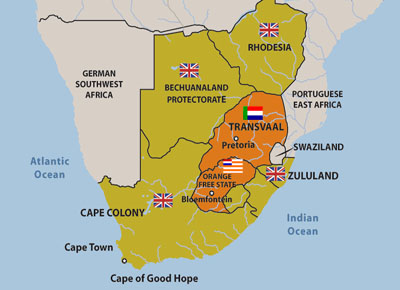 By 1884, there were growing concerns that Boer settlers who were moving into Bechuanaland might link up with German colonists who were settling what was to become German South West Africa (see map to the left). This could have led to the isolation of British controlled southern Africa from the supposedly mineral rich Zambesia to the north.
By 1884, there were growing concerns that Boer settlers who were moving into Bechuanaland might link up with German colonists who were settling what was to become German South West Africa (see map to the left). This could have led to the isolation of British controlled southern Africa from the supposedly mineral rich Zambesia to the north.
There was concern of a German- Transvaal alliance and Rhodes wanted to maintain access to the Zambesia region; thus in 1884 Bechuanaland was declared a British protectorate in 1884.
By 1895, Rhodes' company had eliminated all effective opposition to his control of Rhodesia and Nyasaland. The only barrier to his dream of British supremacy in Southern Africa was the Transvaal. The Boers were interested in the creation of a federation of South African states of which the Transvaal would become a leading power.
In 1895, Rhodes planned an overthrow of Kruger's regime. Rhodes got enough assurances from Uitlanders to convince himself that it was possible to overthrow Kruger by an uprising of Uitlanders who would then invite Britain in to provide protection.
The resulting raid was a disaster. Led by Dr Starr Jameson who was the chief administrator of Rhodes' South Africa Mining Company, the uitlanders did not rise up in support. Jameson and his men were rounded up and sent back to Britain for trial.
Watch this video which discusses the lead up to the Jameson Raid, the key events and the significance of the raid on Anglo - Boer relations.
Answer the questions below (click on the eye).
Questions:
- What was significance of Kruger's actions?
- How was the plan supposed to work?
- What was the role of Chamberlain in the raid?
- What was the role of the uitlanders?
- What aspects of the raid went wrong?
- Why did the British press support the raid?
- What was the significance of the telegram from Kaiser Wilhelm?
- What were the repercussions of this raid?

 IB Docs (2) Team
IB Docs (2) Team
